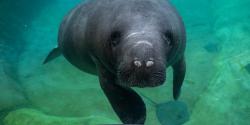[2:17 p.m. Saturday, June 18, 2022]
It’s with tremendous sadness that we share 13-year-old Asian elephant, Beco, passed away around 11 a.m. on Saturday, June 18 from Elephant Endotheliotropic Herpesvirus (EEHV). EEHV is a life-threatening virus affecting elephants living in the wild and in sanctuaries and zoos worldwide.
Beco is the second elephant to succumb to EEHV at the Columbus Zoo. Ganesh, a 7-year-old Indian elephant died in 2005.
Despite the heroic efforts of his devoted Animal Care and Animal Health teams and the expertise of other zoo professionals and scientists across the country, Beco was overcome by the virus. He was surrounded by his care team.
Because EEHV is particularly a threat to all young elephants, the Zoo’s care team proactively uses the latest EEHV detection methods and protocols to test the most vulnerable elephants in the herd weekly. Prior to the confirmed diagnosis on June 16, Beco’s most recent blood work was normal. Currently, there are no signs of EEHV in the other six members of the elephant herd, though the Zoo’s Animal Care and Animal Health teams continue to monitor them closely.
We are eternally grateful for the extra support from the many scientists and zoo professionals across the country who offered their expertise and guidance to our teams. We know Beco’s passing weighs heavy on their hearts as well.
Please keep the elephant team and all of Beco’s care team in your thoughts as they mourn the life of this majestic creature.
For more information about Beco and his care, please read our press release. More information about EEHV can be found in our FAQs.
[7:45 p.m. Friday, June 17, 2022]
The overwhelming response from our colleagues across the country has been unbelievable but not surprising – it’s so powerful to see so many intelligent and dedicated colleagues working together for Beco’s wellbeing. Beco’s care teams, including Animal Health and his elephant care staff, have the expertise and support of an estimated 20 institutions from across the country! In addition, our colleagues at the Smithsonian’s National Zoo and Conservation Biology Institute are transporting their National Elephant Herpes Laboratory (a mobile EEHV lab) to the Columbus Zoo on Saturday so our teams can have Beco’s test results quicker to guide treatment for the day.
Here’s are some highlights from the day:
- Beco continues to eat and is very cooperative with his treatments
- Treatment consists of fluids, medication, blood or stem cell transfusions
- Beco’s pachyderm team is with him around the clock, offering him comfort by talking to him
- Team members throughout our Family of Parks have shown an outpouring of support by driving samples, delivering food, and providing assistance during Beco’s treatment.
EEHV is unpredictable, and Beco’s care team is prepared for unexpected scenarios. We remain cautiously optimistic.
We want to thank all of you for your uplifting and positive words of support for Beco and his dedicated care teams. We are so grateful and humbled by the outpouring of love.
For more information about EEHV, please visit our FAQs here.
[8:47 a.m. Friday, June 17, 2022]
Late last night, we received test results confirming Beco, a 13-year-old Asian elephant, is positive for active Elephant Endotheliotropic Herpesvirus (EEHV), a life-threatening health issue for some elephants living in the wild and in sanctuaries and zoos worldwide.
Knowing that EEHV is a threat to all young elephants that have not built an immunity to the virus, the Zoo’s care team uses the latest EEHV detection and testing protocols and consistently monitors our elephants, including Frankie, who just turned 1 year old. Before today, Beco’s most recent blood work was normal.
The pachyderm team is so attune to the normal behaviors of our elephants that they noticed Beco was uncharacteristically lethargic. Concerned, they immediately called the Animal Health team, which collected and sent Beco’s blood sample to the National Elephant Herpesvirus Laboratory at the Smithsonian’s National Zoo for analysis. The lab confirmed the diagnosis. In severe EEHV cases, a high virus level in an elephant can cause progressive hemorrhagic or bleeding that can be fatal.
Currently, Beco is receiving around the clock care to monitor his health. He’s receiving antiviral medication and other treatments. Beco is in good hands with our dedicated and talented Animal Health and pachyderm experts. We are grateful for the extra support from a slew of scientists, academic and zoo professionals from across the country – all contributing expertise and guidance to our teams.
Columbus Zoo and Aquarium collaborates with several other North American zoos caring for elephants to actively support EEHV research with a goal to develop new treatments and eventually a preventative vaccine to help elephants globally.
The truth is scientists and elephant experts around the world are working to learn more about EEHV. We do know that elephants, like most mammals, can carry different herpesviruses throughout their lives and usually those viruses remain hidden and do not cause illness. EEHV does not discriminate between zoo elephants and elephants in the wild. Whether it’s a calf at a zoo, or the young of a herd in the wilds of Asia, EEHV can strike without any known causes or reason.
Beco and his army of devoted caretakers have a long road ahead of them. The course of this disease is unpredictable but we are cautiously optimistic.
We appreciate Beco’s many fans in our community and beyond and we will continue to provide updates on his health. For now, please continue to send positive thoughts to Beco and his care team.
For more information, please visit our FAQs here.









